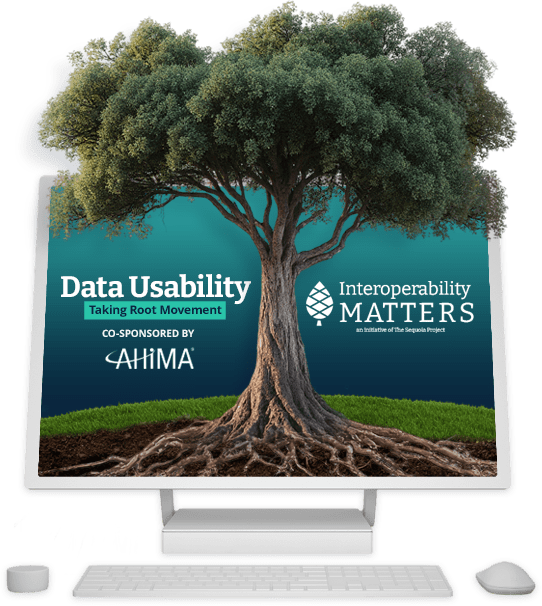*Save the Date* The Sequoia Project and Carequality Annual Meeting will be November 18-19, 2026 – Learn More


The first session explores what data usability is, why it’s important and how Data Usability Implementation Guide (DUIG) V1.0 and 2.0 can advance usability.
The second session examines laboratory data usability, why it’s an especially vital use case, and how the newly released DUIG V2.0 can advance meaningful interoperability.
The third session takes a look at self-assessment tools to implement DUIG V2.0 and information on the opportunity to participate in a community of practice to advance adoption.

Lauren currently serves as AHIMA’s Chief Public Policy and Impact Officer. In this capacity, she is responsible for providing strategic and operational oversight over AHIMA’s advocacy and programmatic strategy to demonstrate mission impact. Prior to that, Lauren served as Vice President of Policy & Government Affairs at AHIMA, overseeing the organization’s policy and advocacy before Congress and various federal agencies. With two decades of healthcare policy experience, Lauren previously worked on Capitol Hill where she was actively involved in almost every aspect of a congressional office, including serving as Chief of Staff—a position that requires the ability to quickly synthesize multiple issues and adapt to constantly shifting priorities. Lauren received her JD from American University Washington College of Law and a Bachelor of Arts from Vanderbilt University. She is admitted to practice law in New York.

Mrs. Davis has >25 years’ experience in the healthcare industry with emphasis on conformance testing, implementation, development, and management of information technology solutions and healthcare workflow requirements. She serves as the VP, Informatics, Conformance and Interoperability for the Sequoia Project that is a 501©3 not for profit organization based in Washington, DC. Her expertise includes connecting people, processes and technology to improve health care. She is responsible for the operations of 8 testing programs for Sequoia, including the RCE onboarding testing for TEFCA. She leads a group of experts from a wide range of stakeholders across the US to develop specific and pragmatic implementation guidance on improving data quality of the clinical content exchanged among networks and communities in the Data Usability workgroup under the Sequoia Interoperability Matters Forum. She also acts as the subject matter expert supporting the deployment efforts of the Image Exchange Use Case Implementation Guide for Carequality.
A panel shares testimonials on the importance of data usability and how their organizations made data usability a priority

Natalee Agassi, PharmD, MD, is a healthcare informatics expert and ontology-driven AI thought leader who builds safe, interoperable, and scalable clinical systems. As Director of Clinical AI & Data Architecture at Oracle Health, she oversees the clinical strategy for knowledge-graph–grounded RAG powering decision support.Also, she advanced enterprise semantic models, migrated global terminology to Oracle Cloud, harmonized standards with the VA, and delivered measurable savings, faster delivery, and new growth.
Her cross-disciplinary expertise spans Health Information Systems, clinical terminologies, HL7 standards. She is passionate improve data usability and laboratory interoperability. Her portfolio includes multiple issued and provisional patents across interoperability, clinical documentation, knowledge management, and ontology-guided reconciliation.
A systems thinker, Natalee blends real-world data analytics, large language models, and ontologies to generate structured notes, infer indications and contraindications, reduce duplication, and elevate decision support across care settings. Her programs have accelerated timelines, lowered development costs, and enabled growth in public and federal sectors.
A former pharmacy manager and hospital clinician, she brings pragmatic, patient-centered judgment to complex informatics problems. Natalee holds a Doctor of Pharmacy from the University of the Sciences in Philadelphia and a Doctor of Medicine from O.O. Bogomolets National Medical University. Known for collaborative leadership, rigor, and invention, she champions trustworthy AI, standards-based interoperability, and high-reliability operations—advancing safer care, better outcomes, and scalable innovation.

Zach Heiman is a software developer on Epic’s Care Everywhere team, the company’s interoperability platform, based in Verona, WI. He has focused his career on improving the quality and accessibility of health data to support seamless transitions of care and integrate external information directly into patient and provider workflows. Zach has also contributed to Epic’s regulatory review efforts, providing public comment on state and federal policies and leading development initiatives to ensure compliance. As a member of the Sequoia Data Usability Workgroup since its inception, he is dedicated to advancing data quality and usability standards to enable vendor-agnostic exchange and remove barriers to cross-vendor interoperability.

Melany Byerly leads the Health IT Outreach and Onboarding team at the Social Security Administration (SSA), where she oversees the integration of new partners into SSA’s active production environment. With over a decade of experience on the Health IT (HIT) initiative, Melany brings deep expertise and has been instrumental in driving its continued growth.
Her understanding of the critical role data plays in supporting claimants, state Disability Determination Services (DDS), and SSA stems from a career rooted in service. Melany began her professional journey in community mental health in Western Pennsylvania, helping individuals apply for SSI/SSDI benefits. At the time, accessing medical records meant physically retrieving paper documents from providers—an experience that gave her firsthand insight into the barriers claimants face. She saw how timely access to benefits and healthcare coverage could dramatically improve lives.
Melany later served at the Pennsylvania DDS, where she made medical determinations on disability claims. Delays in receiving records often led to long wait times and costly consultative exams. The implementation of HIT has revolutionized this process, enabling near-instant access to medical information and significantly improving efficiency and outcomes.
Her work at SSA brings her full circle, encompassing every phase of the disability determination process. Melany is a passionate advocate for data usability and completeness, recognizing that accessible medical information is vital to the success of SSA’s disability programs. Her commitment ensures that HIT continues to deliver value to all stakeholders—claimants, DDS, medical providers, and SSA alike.

William (Bill) Gregg, MD, MS, MPH, joined HCA Healthcare in 2014 and serves as Vice President of Interoperability. In addition to his medical degree, Dr. Gregg holds an undergraduate degree in Electrical Engineering from the Georgia Institute of Technology. He earned master’s degrees in Clinical Informatics and Public Health at Vanderbilt University and was a VA Quality Scholars Fellow. He is board certified in Internal Medicine and Clinical Informatics. At a national level, he is Co-Chair of the Sequoia Project’s Data Usability Workgroup whose charge is to identify practical solutions to make interoperability work better for clinicians and patients. Dr. Gregg also serves on the Sequoia Project Interoperability Matters Leadership Council and the SMART Health IT Advisory Committee. Prior to joining HCA, Dr. Gregg served as an Assistant Professor of Informatics and Medicine at Vanderbilt University and was the Director of Population Health Informatics. He helped develop successful clinical programs and led software development in population health and clinical decision support. His primary focus is on system level integration of technology, interoperability, and processes to support transformation of clinical care in our rapidly changing healthcare landscape.

In his current role at AHIMA, Andrew advocates on behalf of AHIMA members on issues related to the intersection of technology and healthcare both domestically and abroad. Prior to his time at AHIMA, Andrew served as the Director of Federal Affairs at the College of Healthcare Information Management Executives (CHIME) and as a Director of External Affairs at UnitedHealth Group. Andrew has worked on health IT policy for over 10 years, including during a six-year career at the Office of the National Coordinator for Health Information Technology (ONC) that culminated with a posting focused on international health IT issues and stakeholder engagement for the National Coordinator. A graduate of American University in Washington, DC, Andrew grew up in metro-Detroit and currently resides with his wife and dog in Baltimore, MD.





Why Paper Just Doesn’t Cut it Anymore – a panel of healthcare providers share testimonials on the importance of lab data usability

Steven Lane is a practicing family physician and clinical informaticist with over 35 years’ experience advancing the use of health information and technology to improve health and healthcare. He previously served as the Clinical Informatics Directory for Privacy, Security & Interoperability at Sutter Health and as a founding member of the federal Health IT Advisory Committee. As Chief Medical Officer of Health Gorilla, Dr. Lane is helping to lead one of the first Qualified Health Information Networks (QHINs), as part of the national Trusted Exchange Framework and Common Agreement (TEFCA), as well as one of the Qualified Health Information Organizations (QHIOs) facilitating the California Data Exchange Framework (DxF). Dr. Lane currently serves as a member of the TEFCA Governing Council, the HIMSS Public Policy Committee, The Sequoia Project’s Privacy & Consent Workgroup, and other national and regional committees impacting policies and technology standards that support health data access, use, and exchange.

Katherine Lusk, MHSM, RHIA, FAHIMA is the Vice President Strategic Partnerships for the Texas Health Services Authority with a focus on cross-industry facilitation of trusted data exchange that supports innovation and data mobility. She has long championed interoperability serving in multiple volunteer roles including DirectTrust Board, Past President AHIMA, eHealth Exchange Workgroup, ONC Patient Identity Workgroup, Epic’s Care Everywhere Governing Council, ONC / AHIMA Project US@ Companion Guide, e-Health Advisory Committee, Texas Health Informatics Alliance, and the THSA state-wide multidisciplinary vendor agnostic Interoperability collaborative. She is a strong believer in the power of informatics to bridge healthcare delivery gaps.

Andrea Pitkus, PhD, MLS (ASCP)CM,FAMIA is an Ontologist at University of Wisconsin-Madison’s, School of Medicine and Public Health, supporting clinician, researcher and cancer center informatics needs. She serves as Vice Chair of the SHIELD Collaborative Community, received the 2023 LOINC Award for Distinguished Contributions, and is a Fellow of the American Medical Informatics Association. She focuses on laboratory data interoperability and usability needs, contributing to the LOINC Committee, SHIELD, HL7, ASCLS Patient Safety, and AMIA Clinical Decision Support Workgroups, among others. On UW’s Promaps team, Dr. Weed’s Problem Oriented View within EHRs was generated. At IMO, she was LabIT Product Manager. As Senior Laboratory Informatics Consultant for the College of American Pathologists, her expertise as laboratory informatics SME included cancer and laboratory reporting (ELR) to public health. She was lead laboratory SME for the CDC-funded Lab Interoperability Cooperative (LIC) and University of California Davis CHeQ grant projects. Previously, as IHE Laboratory Domain Secretariat for CAP, standards interfacing lab diagnostics and lab information systems were updated. Dr. Pitkus received a PhD in Health Informatics from the University of Minnesota in Minneapolis, where she completed courses in the Clinical Laboratory Science Master’s degree program. Her Bachelor of Science degree in Medical Technology is from Winona State University in Winona, Minnesota. She is certified by the American Society for Clinical Pathology as a Medical Laboratory Scientist, with over 15 years of clinical laboratory experience. Dr. Pitkus presents internationally on structured laboratory reporting, interoperability, and health standards to laboratory, informatics, and public health audiences.

Dr. Adam Davis is a leading expert in health data interoperability, serving as a Physician Informaticist at Sutter Health since 2012. He is Sutter's informatics lead for interoperability, spearheading their efforts in TEFCA and the California Data Exchange Framework (Ca DxF). Nationally, Dr. Davis has chaired Epic's CareEverywhere Governing Council for three years and leads Carequality's Interoperability Matters Data Usability Workgroup.
As the Chief Medical Officer for SCHIO since 2023, Dr. Davis continues to drive innovations in healthcare interoperability. In addition to his informatics work, he has been a dedicated practicing Primary Care Pediatrician at SF Bay Pediatrics since 2017.

Tara O’Donnell is a Manager, Regulatory Affairs at the American Health Information Management Association (AHIMA), where she advocates to federal agencies on a wide range of issues related to healthcare information technology. Tara has particular interest in information blocking, utilization management processes, and interoperability, and enjoys learning about technical standards and implementation guides. Prior to joining AHIMA, she spent several years at the American Academy of Family Physicians (AAFP) working on both state and federal policy and advocacy, as well as at the Gallaudet University Center for Deaf Health Excellence. Tara received a Bachelor of Science degree in public health and a Master of Public Health degree with a concentration in health policy, both from the George Washington University, and resides in Bethesda, Maryland.






Riki Merrick, MPH is a licensed physician in Germany and has worked in Public Health informatics since 2004. She is currently the lead terminologist at the Association of Public Health Laboratories focusing on laboratory data interoperability on several national projects that include mapping to terminology standards like LOINC® and SNOMED CT®. She is the Chair of the SHIELD Collaborative Community whose mission is to “Describe the SAME test the SAME way ANYWHERE in the Healthcare ecosystem”. As an HL7 Fellow, she also holds several other leadership roles at HL7®, at IHE as well as the Laboratory and Messaging Community of Practice (LabMCoP). She is the editor of several chapters in the HL7® Version 2 Messaging Standard, has authored several laboratory data related implementation guides, co-authored chapters in educational books and supported NIST with the development of conformance profiles and test cases for lab related message validation tools.




How innovators are moving their organization to implement data usability guidance – a panel of healthcare providers, health information networks, and HIT developers share testimonials on participating in the community of practice.

Laura Nixon is Vice President of Interoperability Solutions at Clinical Architecture, where she leads strategy and partnerships to advance healthcare data quality, usability, and trust at scale. She works at the intersection of policy, standards, and technology, helping health information exchanges, community information exchanges, payers, and providers operationalize interoperability in ways that make data more usable and actionable.
Laura is deeply engaged in advancing the Patient Information Quality Improvement (PIQI) Framework, an open community initiative that defines a standards-based approach to assessing and improving patient data. Through this work, she helps organizations and communities explore practical methods for applying evaluation rubrics and modular assessment logic to identify issues, support remediation, and improve readiness for both clinical and reporting use.
Her work at Clinical Architecture also spans product innovation and market development for PIQXL Gateway, Pivot, and Symedical: solutions designed to normalize, remediate, and manage terminology at enterprise scale. Through these initiatives, Laura helps organizations move beyond connectivity to establish confidence in the quality and integrity of the data flowing through their systems.
Before joining Clinical Architecture, Laura guided large-scale community health and public health interoperability initiatives, with a focus on behavioral health integration, consent management, and multi-sector collaboration. She is a frequent presenter on the role of semantic alignment, value set management, and quality evaluation frameworks in strengthening healthcare interoperability.
Laura’s passion lies in building trust between systems, organizations, and people by ensuring that the data exchanged across the healthcare ecosystem is meaningful, usable, and reliable.

Lisa Nelson is a creative innovator, experienced business manager, and medical informaticist with over 25 years of experience in the development and use of health information technology (HIT) standards. Committed to improving accessibility for patient’s health data, her previous responsibilities have included SMART on FHIR app technology integration with EHR solutions and other legacy platforms, FHIR document registry development, product management for a Cardiology PACS solution, professional services delivery, business development, and founding of a 501-C3 focused on health literacy for 21st century consumers.
Lisa is active in the development and adoption of HL7, DirectTrust, and IHE standards. She is a founding member of the HL7 CDA Management Group and has been a contributing author on multiple national standards for the use of digital health records and clinical quality measures.





Mariann Yeager has more than 20 years of experience in the health information technology field. She currently serves as CEO for The Sequoia Project, a non-profit solely focused on advancing secure, interoperable nationwide health data sharing in the US. She leads the Recognized Coordinating Entity (RCE) effort, in close collaboration with the Office of the National Coordinator for Health IT to develop, implement, and maintain the Common Agreement component of the Trusted Exchange Framework and Common Agreement (TEFCA) and to operationalize the Qualified Health Information Network (QHIN) designation and monitoring process. The Sequoia Project serves as a steward of independently governed health IT interoperability initiatives, including the RSNA Image Share Validation Program and the Interoperability Matters program, which engages experts from across the healthcare and health IT communities to collaborate to solve discrete challenges to nationwide health information sharing through various workgroups. Ongoing Interoperability Matters workgroups include Information Sharing workgroup, Data Usability workgroup, and the Public Health workgroup. Under her leadership, The Sequoia Project supported, the startup, growth and maturation of two highly successfully interoperability initiatives, the eHealth Exchange and Carequality, which now operate as independent non-profit organizations. Prior to her tenure at The Sequoia Project, she worked with the HHS Office of National Coordinator (ONC) for five years on nationwide health information network initiatives. She also led the launch and operation of the first ambulatory and inpatient EHR certification program in the US.
To advance implementation of data usability guidance for a more meaningful exchange of critical data on a national scale. Better data usability benefits providers, operational & health information management staff, health information exchanges & networks, health IT platforms, public health, and patients.
Combines technical education with real-world stories from the frontlines, addresses critical interoperability barriers with healthcare laboratory data, promotes real-world operationalization of technical guidance, and encourages participation in a community of practice that can help participants on their data usability journey.
To get Interoperability Matters notifications complete the form below:
Complete the form below to access the Data Usability Virtual Workshop video recordings.